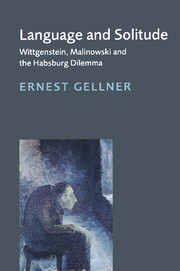Book contents
- Frontmatter
- Contents
- Preface
- Foreword
- Part I The Habsburg dilemma
- Part II Wittgenstein
- Part III Malinowski
- 23 The birth of modern social anthropology
- 24 The Malinowskian revolution
- 25 How did Malinowski get there?
- 26 Whither anthropology? Or: whither Bronislaw?
- 27 The difference between Cracow and Vienna
- 28 Malinowski's achievement and politics
- 29 Malinowski's theory of language
- 30 Malinowski's later mistake
- 31 The (un)originality of Malinowski and Wittgenstein
- Part IV Influences
- Part V Conclusions
- General bibliography
- Bibliographies of Ernest Gellner's writings on Wittgenstein, Malinowski, and nationalism
- Index
31 - The (un)originality of Malinowski and Wittgenstein
Published online by Cambridge University Press: 05 March 2010
- Frontmatter
- Contents
- Preface
- Foreword
- Part I The Habsburg dilemma
- Part II Wittgenstein
- Part III Malinowski
- 23 The birth of modern social anthropology
- 24 The Malinowskian revolution
- 25 How did Malinowski get there?
- 26 Whither anthropology? Or: whither Bronislaw?
- 27 The difference between Cracow and Vienna
- 28 Malinowski's achievement and politics
- 29 Malinowski's theory of language
- 30 Malinowski's later mistake
- 31 The (un)originality of Malinowski and Wittgenstein
- Part IV Influences
- Part V Conclusions
- General bibliography
- Bibliographies of Ernest Gellner's writings on Wittgenstein, Malinowski, and nationalism
- Index
Summary
The similarities between Malinowski's and Wittgenstein's view of language are striking and important and the question naturally arises whether Wittgenstein borrowed, consciously or otherwise, from Malinowski. If he did, he certainly did not acknowledge it. Malinowski was unquestionably the first to publish the action-involved, cultureembedded view of language, and he did so at the very time when Wittgenstein was still committed to the ‘mirror’ or ‘brass-rubbing’ theory of language, and the total irrelevance of culture to the real function of thought and language. Moreover, in 1923 Malinowski published his ideas as an Appendix to The Meaning of Meaning, coauthored by C. K. Ogden, who was at the same time Wittgenstein's translator.
An interesting and highly authoritative contribution to this question appears in the form of a letter from Sir Raymond Firth to the Times Literary Supplement, dated 17 March 1995. Firth was Malinowski's pupil, colleague, and successor, as well as editor of the posthumous Festschrift to Malinowski (Man and Culture) in which his erstwhile pupils collectively expressed their intellectual and other indebtedness to him. Firth was close to Malinowski intellectually, personally and professionally, and his views therefore deserve the utmost respect. Firth tells us that Wittgenstein did receive a copy of The Meaning of Meaning (containing the relevant Appendix by Malinowski) ‘soon after it appeared, and characteristically seemed very dismissive of it. He may not even have glanced at Malinowski's essay … any resemblance in their views may be accidental’ (Firth 1995).
Perhaps we shall never find out whether or not Wittgenstein was aware of Malinowski's views. In my opinion it does not matter, because neither of them initiated the idea in question.
- Type
- Chapter
- Information
- Language and SolitudeWittgenstein, Malinowski and the Habsburg Dilemma, pp. 155 - 156Publisher: Cambridge University PressPrint publication year: 1998



